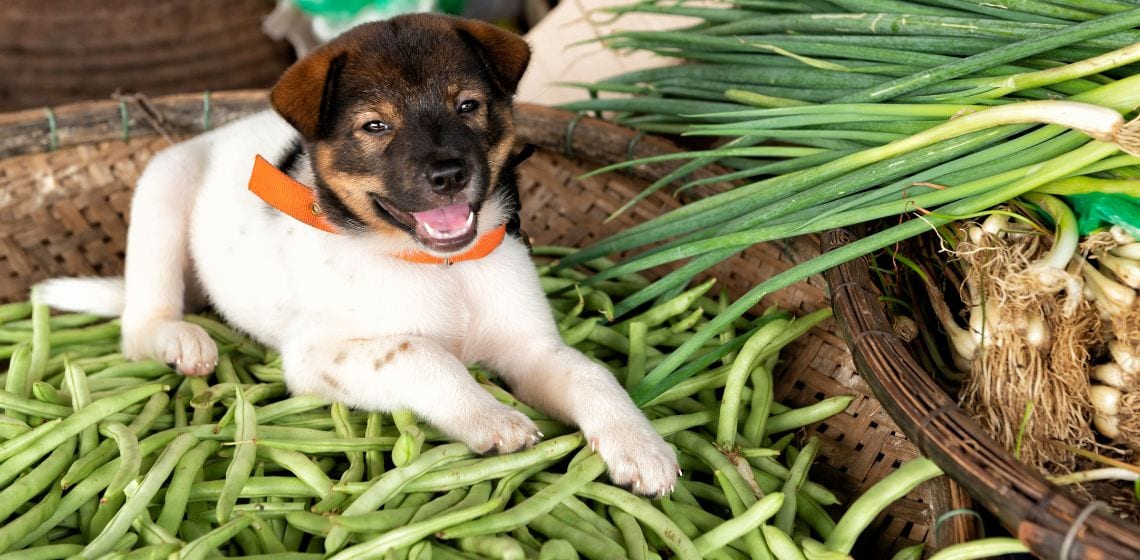All pet parents want the best for their pets, and naturally, that includes getting their nutrition right. However, with so much conflicting advice available online this can prove challenging! So, let’s take a look at soy: is soy safe for dogs?
Table of Content
What is soy?
The soybean plant is a legume, part of the pea family. It is native to Eastern Asia, where it has been a staple part of human diets for a long time. For humans, you can get unfermented soya products (such as soya milk, soya yogurt, soya butter, tofu, and soya-based meat substitutes) or fermented products (such as miso).
In dog food, you may see soya, soy, soya beans, soybean protein, or soya meal in the ingredients list.
Can dogs eat soy?
Yes, soy as an ingredient is a perfectly safe protein source for most dogs. However, as with all things, it’s important to be aware of the other ingredients in a food. For example, while soy is OK for dogs, soy sauce would not be! Soy sauce is very high in salt and would be harmful for a dog. Soy chorizo is also usually high in salt and may contain onion powder- onions are toxic to dogs!
Tofu is a cheese-like food made from soy. This could make a safe treat for most dogs, again depending on the exact ingredients and whether the dog is allergic or sensitive to soy. If you do decide to introduce any new food to your dog’s diet, it’s really important that you only add one thing at a time. This way, if your dog has a reaction, you’ll know what it’s reacting to. It’s also really important to introduce it gradually, offering just a tiny bit every few days initially.
It’s safest to stick with soy as an ingredient in dog food, rather than offering human soy food. Remember, many human foods are toxic to dogs, so it’s better to be safe and stick with dog food. Portion control can also be an issue when offering human foods since a human-sized portion would be enormous for a dog! With obesity on the rise in dogs, this is another reason to stick with dog food.
Are dogs allergic to soy?
Soy is an allergen, so dogs can be allergic to soy. An allergy to any protein is possible. However, it isn’t a common allergen in dogs. Beef, dairy, and wheat are the most common allergens in dogs.
If your dog shows any of the following symptoms after eating soy, then they may be allergic:
- Itchy skin
- Itchy paws
- Itchy ears
- Gut symptoms such as sickness or diarrhea
If you notice any of these symptoms, schedule an appointment with your veterinarian.
Soy protein is used in some dog foods designed for dogs with allergies. The protein is hydrolyzed (broken down into little parts), making it very unlikely to cause a reaction.
Is soy a good ingredient in dog foods?
Despite many myths circulating, soy can be a good ingredient in dog food. Soy is:
- A good source of protein and essential amino acids
- High in protein, but low fat
- Rich in omega 3 and omega 6 fatty acids, which have anti-inflammatory properties (as well as being important for other things)
- A good fiber source
- A good source of vitamins and minerals
There has been some suggestion that eating soy increases the risk of bloat, by fermentation in the guts causing excess gas. However, studies have shown that feeding soy in a dog’s diet does not increase gas production or flatulence, nor increase the risk of bloat (medically known as GDV- gastric dilatation volvulus).
There has also been some concern around the digestibility of soy as a protein source. This means how well a dog can digest the food and absorb nutrients from it. Some animal proteins will have higher digestibility for dogs, but some animal proteins will also have lower digestibility! Remember, digestibility will also depend on the cooking and processing methods.
The bottom line?
When included in a nutritionally balanced, complete dog food soy can be a good protein source for dogs. Allergies to soy are pretty rare in dogs and eating soy has not been shown to increase the risk of bloat. As with all proteins, soy can cause allergic reactions. So, as with any new food or ingredient, remember to introduce any new diet slowly over a couple of weeks. Soy is safest fed as an ingredient in a complete dog food, rather than offering your dog human soy products.
FAQ
Soy is good for most dogs if fed as part of a nutritionally complete and balanced diet. Some dogs will be allergic to soy, but soy allergies are not common in dogs. Some human foods containing soy are not good for dogs, such as soy sauce, which is much too high in salt for dogs.
Most dogs can safely eat soy, with no ill effects. If your dog is allergic to soy, they would show symptoms after eating soy. Symptoms of a food allergy in dogs include itchy skin and/or digestive upset (sickness and diarrhea). If your dog eats soy in a human food, then it’s important to check the other ingredients. Many human foods are too high in salt for dogs, and some are even toxic to dogs. Call your veterinarian for advice if you aren’t sure.
Yes, most dogs can eat cooked soybeans safely. Soybean allergies are not common in dogs. As with anything, moderation is key! It’s very hard to formulate a nutritionally complete diet for dogs at home, so it’s safest to stick with soy as an ingredient in a good quality dog food. If you do wish to offer home-cooked meals, it’s important that you consult a veterinary nutritionist first.








